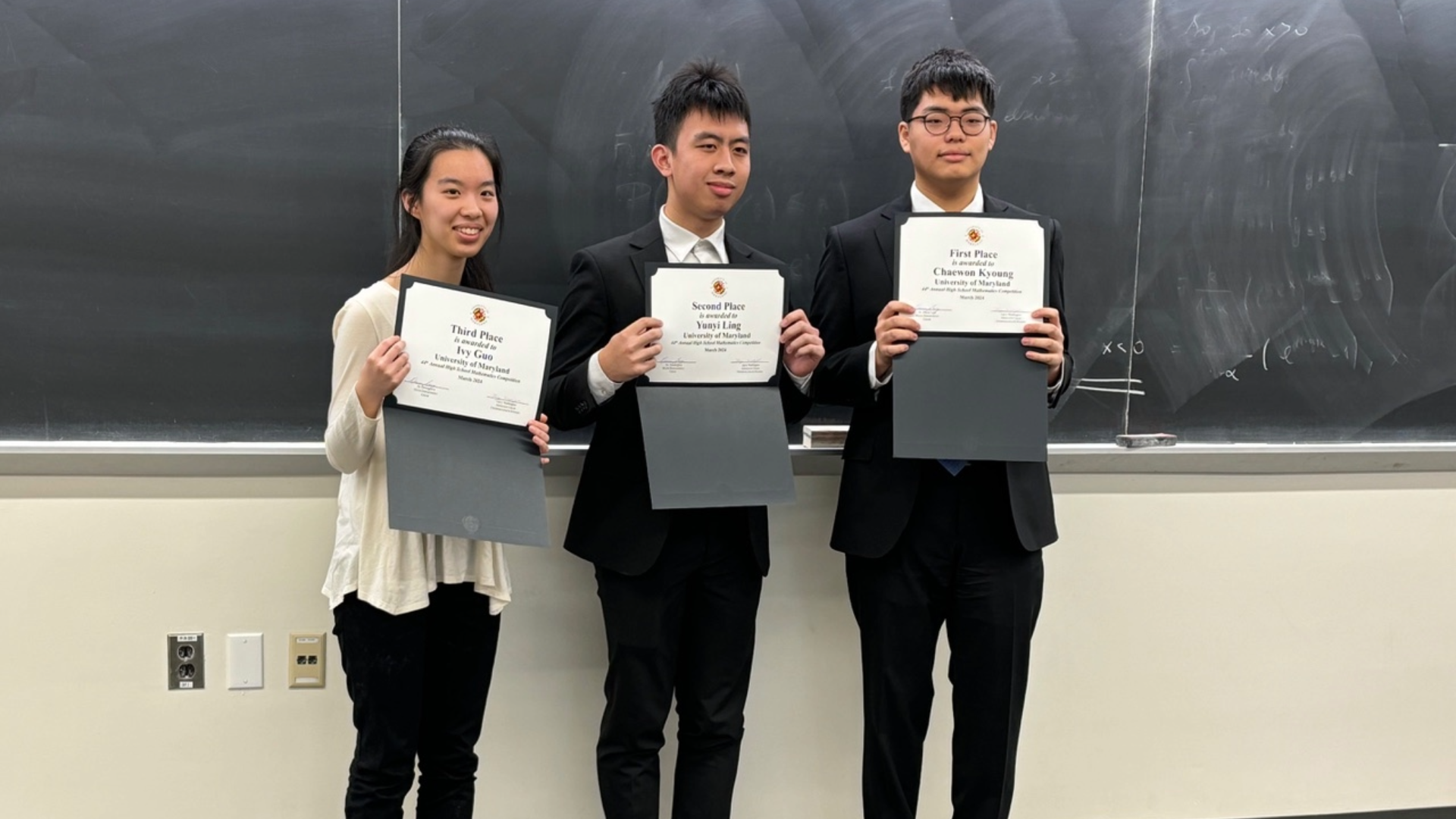

For over 45 years, participating in the University of Maryland’s High School Math Competition has been a rite of passage for young aspiring mathematicians from Maryland and the District of Columbia.
Open to all Maryland and D.C. high school students, the competition rigorously tests participants’ knowledge of pre-calculus topics such as algebra, combinatorics, geometry and number theory. Competitors sit for a proctored, two-part exam consisting of a 75-minute multiple-choice portion and a two-hour proof-based/free-response section.
The top three scorers are offered full scholarships to attend UMD. In addition, high-scoring students from each county may receive other monetary prizes. Past winners of the contest have gone on to become highly celebrated figures in both academia and industry—among them Google co-founder Sergey Brin (B.S. ’93, mathematics and computer science) and mathematics professors at universities across the country.
For the thousands of students who have taken part in the competition over the years, the contest is about more than just awards; it’s also a unique chance to showcase their mathematical problem-solving skills under pressure.
“In many ways, the contest calls for a different set of skills than what’s required in a standard math curriculum,” said Daniel Yuan, a mathematics and computer science double major who ranked first in the math competitions held in 2018, 2019 and 2021. “Students don’t usually get a chance to flex their ability to solve complex, multi-layered problems by hand. Without tools like calculators, contestants are told to use scrap paper and some creative thinking to get through tough questions on a time limit. It’s a different yet fulfilling experience.”
For Yuan, who also played a major role in UMD’s recent success in the prestigious William Lowell Putnam Mathematics Competition, his experience as a high school math contestant was one of the reasons he chose to attend UMD and why he currently plans to continue pursuing his passion for math as a career after graduation.
Yuan isn’t alone—many other UMD math competition alums also say that the contest helped shape their academic goals or even their professional ambitions. Sophia Chen, a freshman bioengineering major who competed last fall, noted that the experience gave her a taste of high-level competitive math and triggered her interest in math contests such as the Putnam Competition. Freshman mathematics major Kelin Zhu, who placed second in the 2022 UMD High School Math Competition, believes that experience pushed him to think more creatively and develop skills that later helped him excel in his math classes at UMD.
“It hones your problem-solving skills in a way that normal math classes just don’t,” Zhu said. “Being a participant helped me smoothly transition into my major classes, especially the upper divisions where we have to be strong in solving proof-based problems. I can see these skills coming in handy after I graduate, especially in the research environments I want to be part of.”
Building a strong legacy for UMD Math
Mathematics Professor Larry Washington and Principal Lecturer Roohollah Ebrahimian work diligently behind the scenes to organize and expand the competition, which has come a long way since it was launched in 1979 by William “Brit” Kirwan, chancellor emeritus of the University System of Maryland and a former chair of UMD’s Department of Mathematics.
“[Brit Kirwan] recognized the need to publicize the department to young students around the state, many of whom probably didn’t realize that we have world-class mathematicians here at UMD,” said Washington, who is the longest-standing member of the competition’s organizing committee. “The contest has helped immensely in recruiting top talents to the university, allowing our department to continue its excellence.”
Ebrahimian, who has served as director of the competition for the past eight years, added that the contest also enables UMD to build strong relationships with the local community. Consistent outreach efforts made a difference when it came to connecting with students who might not have had a chance to be recognized for their math skills before, he said.
“We’ve built a strong network of participating institutions in Maryland and D.C., some of which send dozens or even hundreds of students to compete each year. There have also been a number of homeschooled students and even middle school students who take the exam with their closest public high school,” Ebrahimian noted. “Thanks to those growing relationships, we’re starting to see a general increase in the amount of diversity in the contest’s top performers, particularly in female top rankers—something that we’re excited to expand upon in upcoming competitions.”
In 2024, more than 1,200 high school students from 95 schools took the first part of the exam on October 23, with 246 students qualifying for the next round on December 4. As the conclusion of this year’s math competition approaches, Ebrahimian is already planning for 2025, with hopes of reaching—and inspiring—even more aspiring mathematicians and creative problem-solvers than ever.
“This competition started as a way to give the university and our math department some publicity among local high schools,” Ebrahimian said. “But today, it’s a point of pride for many Maryland and D.C. students who participate, as well as an opportunity for us to highlight and recognize their exceptional mathematical talent. We welcome anyone who’s looking for a challenge beyond what they see in a regular math class.”
The College of Computer, Mathematical, and Natural Sciences at the University of Maryland educates more than 10,000 future scientific leaders in its undergraduate and graduate programs each year. The college’s 10 departments and nine interdisciplinary research centers foster scientific discovery with annual sponsored research funding exceeding $250 million.

Recent Comments